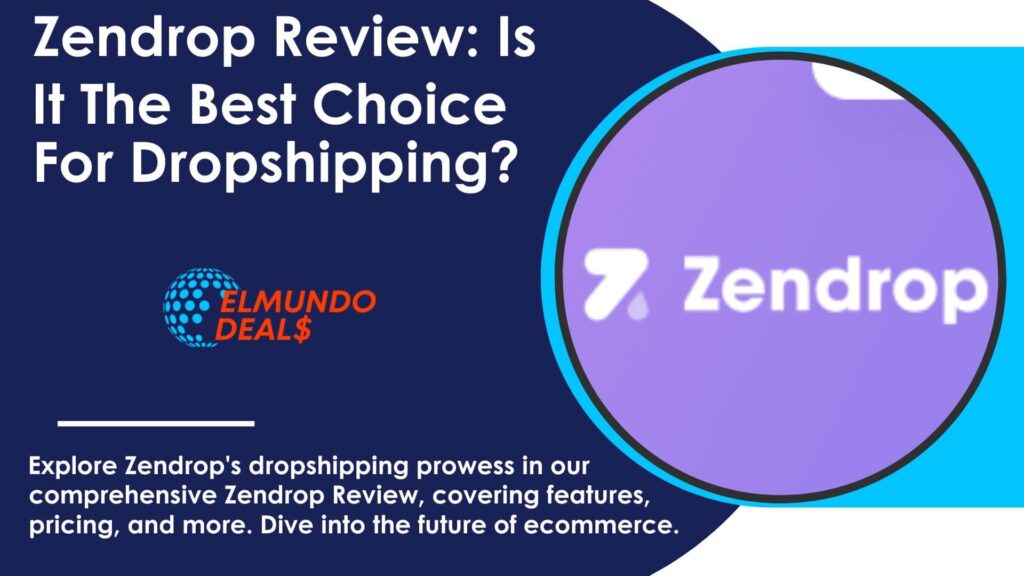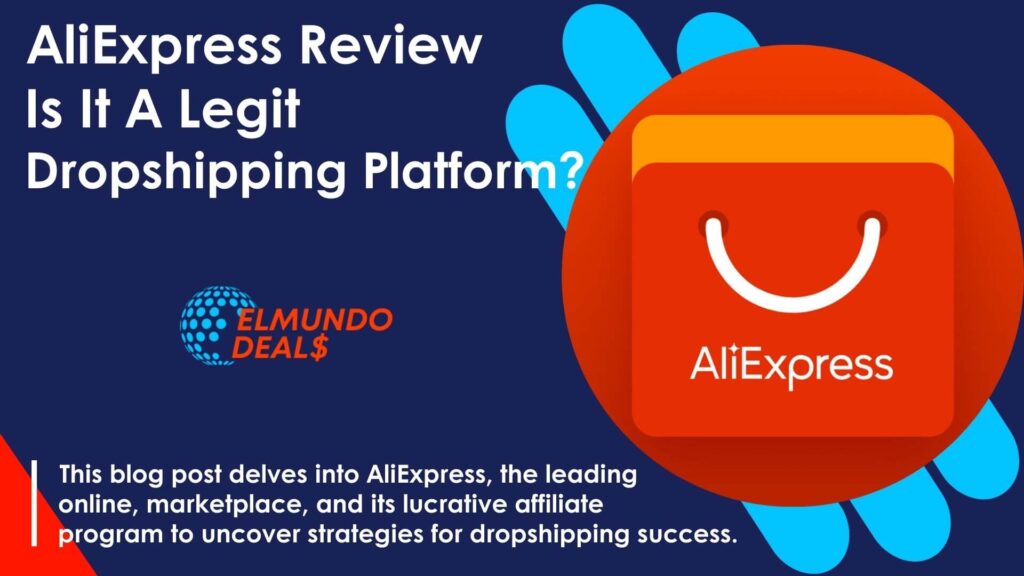How To Choose The Best Payment Gateway For Your Ecommerce? Find The Best Payment Provider
Welcome to the expert guide on choosing the best payment gateway for ecommerce online business. As an industry expert in ecommerce, I’m here to provide you with valuable insights and guidance to ensure a seamless payment process, customer satisfaction, and increased sales.
In this comprehensive and engaging blog post, we will delve into the key factors you need to consider when selecting a payment gateway, discuss the top payment gateway options available, and empower you to make an informed decision that aligns with your business goals.
Brief Summary:
- The crucial importance of selecting the right payment gateway for your online business.
- Key factors to consider when choosing a payment gateway, including transactional efficacy, security features, and customer support.
- An overview of the top payment gateway options, such as Authorize.Net, Stripe, Braintree, and more.
- Insights on payment gateways suitable for small businesses and startups.
- The significance of payment gateways for dropshippers and recommended combinations.
- Answers to frequently asked questions about payment gateways.
- The benefits of using an online payment gateway for your ecommerce business.
By the end of this article, you will have the knowledge and confidence to select the best payment gateway that suits your specific business needs, ensuring a seamless payment experience for your customers and contributing to the success of your online venture. Let’s dive in!

What is an eCommerce Payment Gateway?
A payment gateway is a vital software application that securely transfers card and bank information from your website to the payment network, enabling seamless ecommerce payment processing. It acts as a bridge between your virtual storefront and financial institutions, ensuring smooth online transactions.
When a customer clicks the “Buy Now” button, the payment gateway springs into action, precisely collecting and protecting their payment details. As we explore the intricacies of payment gateways, we will unveil the key insights necessary to discover the ideal solution for your online business.
According to Statista, the digital payments segment is on track to achieve an impressive total transaction value of US$8.49tn in 2022, with projections indicating substantial growth to US$15.17tn by 2027.
The Digital Commerce segment is the largest, with a projected value of US$5.49tn in 2022. These statistics highlight digital payments’ vast potential and importance in the ever-evolving ecommerce landscape.
How does an eCommerce Payment Gateway Work?
An ecommerce payment gateway works in a series of steps to ensure a smooth and secure payment process for your customers. Here’s a simplified breakdown of how it functions:
1. Customer initiates a payment: When a customer decides to make a purchase, they proceed to the checkout page and select their preferred payment method.
2. Payment information submission: The customer enters their payment details on the payment page, such as credit card information or digital wallets. The payment gateway encrypts and securely transfers this sensitive data.
3. Authorization and authentication: The payment gateway verifies the customer’s payment details and checks for sufficient funds or credit availability. It also performs security checks to prevent fraud.
4. Transaction processing: The payment gateway requests authorization from the customer’s issuing bank or payment processor if the payment details are valid. The bank approves or declines the transaction based on the available funds and other factors.
5. Transaction completion: Once the transaction is authorized, the payment gateway confirms the successful payment and notifies both the customer and the merchant. The customer receives a payment confirmation, and the merchant proceeds with order fulfillment.
It’s important to note that this process happens almost instantaneously, ensuring a seamless payment experience for your customers.
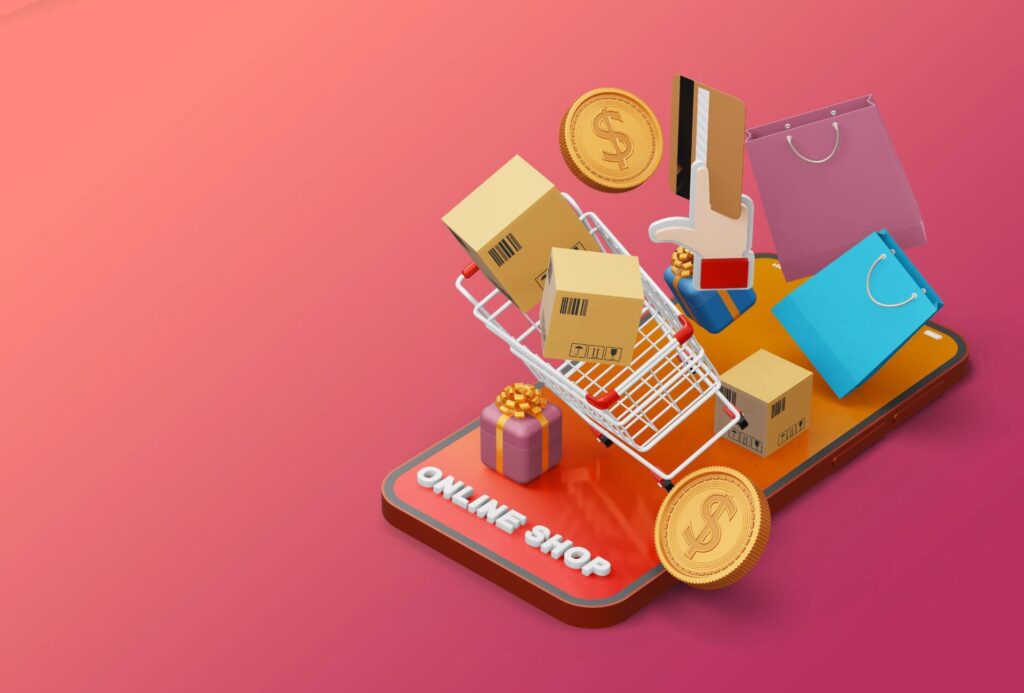

12 Important Factors to Consider When Choosing A Payment Gateway Provider
Selecting the right payment gateway provider for your ecommerce business entails carefully considering various factors to ensure it aligns with your specific needs. Let’s delve into the key considerations that will empower you to make an informed decision:
1. Choose an Appropriate Payment Flow
When selecting a payment gateway provider, consider whether a direct or redirected payment flow aligns better with your business model. A direct payment flow allows customers to complete transactions on your website, providing a seamless checkout experience.
On the other hand, a redirected payment flow redirects customers to a secure external payment page before returning them to your site. Carefully evaluate which flow suits your needs and customer preferences.
2. Choose the Correct Product
Ensuring that the payment gateway supports your specific products or services is essential. Some gateways have industry restrictions or limitations for high-risk businesses. Verify that the payment gateway you choose can handle your product range, avoiding any potential issues or limitations down the line.
3. Transactional Efficacy
Evaluate the payment gateway’s transaction success rate and uptime. A reliable gateway should have a high success rate, ensuring smooth and consistent transactions for your customers.
Additionally, minimal downtime is crucial to prevent revenue loss or customer frustration. Look for reputable payment gateway providers with a track record of reliable transaction processing and uptime.
4. Make Customers Feel Safe and Secure
Prioritize security features when choosing a payment gateway. Encryption, fraud detection mechanisms, and compliance with industry standards such as the Payment Card Industry Data Security Standard (PCI DSS) are essential for creating a secure environment.
Ensuring the safety of your customers’ payment information builds trust and confidence in your ecommerce store.
5. Merchant Account
Determine whether you need a separate merchant account or if the payment gateway provides an integrated solution. A dedicated merchant account offers more control over your funds, allowing for easier reconciliation and access to transaction details.
On the other hand, an integrated solution eliminates the need for a separate account, streamlining the setup process and reducing administrative tasks.
6. Consider Fees and Service Agreement Requirements
Thoroughly review the fee structure associated with the payment gateway. It includes transaction fees, setup fees, monthly fees, and any additional charges.
Understand the terms and conditions outlined in the service agreement, ensuring transparency and avoiding unexpected costs. Compare the fee structures of different payment gateway providers to make an informed decision based on your business requirements.

7. Make Checkout Easy on All Devices
With the growing prevalence of mobile and multi-device shopping, choosing a payment gateway that offers a seamless checkout experience across various devices is crucial.
Whether customers use desktop computers, smartphones, or tablets, the payment process should be intuitive and responsive. A user-friendly checkout experience enhances customer satisfaction and reduces cart abandonment rates.
8. Multifaceted Functionalities
Assess the additional functionalities offered by the payment gateway. Consider features such as recurring billing, subscription management, support for different currencies, and advanced reporting capabilities. These functionalities can enhance the flexibility and scalability of your ecommerce operations, catering to the unique needs of your business.
9. Mobile Payments
In an era of mobile commerce, ensuring that the payment gateway supports mobile payment options is vital. Mobile-friendly checkout processes and compatibility with popular mobile payment methods provide convenience and a seamless payment experience for customers using smartphones or other mobile devices.
10. Easy Integration Process
Consider the ease of integrating the payment gateway with your ecommerce platform or website. Look for payment gateway providers that offer developer-friendly APIs (Application Programming Interfaces) and plugins. These integration options simplify the setup process, allowing seamless communication between your ecommerce platform and the payment gateway.
11. Recurring Billing
Choosing a payment gateway that supports recurring billing functionalities is essential if your business model involves recurring payments or subscription services.
This feature automates the billing process, ensuring a smooth and hassle-free experience for both you and your customers. Verify that the payment gateway can handle recurring billing cycles and manage subscription payments effectively.
12. 24×7 Customer Support
Reliable customer support is crucial in resolving any payment-related issues promptly. Look for a payment gateway provider that offers responsive support through multiple channels such as live chat, phone, or email.
Access to reliable customer support ensures that you can efficiently address any concerns or technical difficulties, minimizing potential disruptions to your ecommerce operations.

Types of payment gateways For ecommerce
In the ever-evolving world of ecommerce, various types of payment gateways cater to the diverse needs of businesses. Let’s explore some common types and their unique characteristics:
- Hosted Payment Gateway: This type of gateway directs customers to a secure payment page hosted by the gateway provider. It simplifies the Payment Card Industry Data Security Standard (PCI DSS) compliance process for merchants, as the gateway handles sensitive payment information.
- Integrated Payment Gateway: Integrated gateways enable customers to complete the payment process without leaving your website. It offers a seamless, branded checkout experience, enhancing customer trust and loyalty.
- Self-hosted Payment Gateway: With a self-hosted gateway, you host the payment page on your servers, giving you greater control and customization options. However, it requires additional security measures to protect customer data.
- API-based Payment Gateway: API-based gateways provide developers with Application Programming Interfaces (APIs) to integrate payment functionalities directly into their applications or websites. It allows for seamless customization and a tailored user experience.
- Mobile Payment Gateway: As mobile commerce continues to thrive, mobile payment gateways optimize the checkout process for smartphones and other mobile devices. They offer mobile-specific payment methods and ensure a smooth mobile payment experience.
Understanding the different types of payment gateways empowers you to make an informed decision based on your business requirements and customer preferences. Consider factors such as security, user experience, customization options, and mobile compatibility when choosing the most suitable payment gateway for your ecommerce venture.
By selecting the right gateway, you can enhance the payment experience, boost customer satisfaction, and drive the growth of your online business.
Also check the following:
- 9 Tips For Writing Product Descriptions That Sell Instantly
- 7 Best Payment Gateways For Shopify Stores In 2023: Payment Method
- What Is Ecommerce Marketing? Strategies, Tools, Tips & More
- 25+ Best Shopify Apps To Grow Your Ecommerce Store In 2023
- 10 Unbelievable Winning Shopify Dropshipping Store Examples (2023)
The benefits of using an online payment gateway
Integrating an online payment gateway into your ecommerce store brings numerous advantages for both merchants and customers. Let’s delve into the benefits of incorporating a payment gateway:
1. Enhanced Customer Experience: Online payment gateways provide a seamless and secure payment experience, instilling customer confidence and enhancing their trust in your business.
2. Expanded Payment Options: Payment gateways support various payment methods, including credit cards, digital wallets, and alternative payment options. This versatility caters to diverse customer preferences, ensuring a convenient and flexible checkout process.
3. Faster Transaction Processing: With automated payment processing, gateways facilitate faster transactions, reducing checkout time and improving overall customer satisfaction. This efficiency can positively impact your conversion rates and customer retention.
4. Improved Security: Payment gateways prioritize security measures such as data encryption and fraud detection systems. By safeguarding sensitive payment information, they offer peace of mind to both merchants and customers, protecting against potential risks.
5. Global Reach: Many payment gateways support international transactions and multiple currencies, enabling you to expand your customer base globally. This global reach opens up new opportunities for growth and revenue generation.
6. Streamlined Business Operations: Payment gateways provide efficient transaction management tools, comprehensive reporting functionalities, and seamless integrations with accounting systems. These features streamline your business operations, simplifying payment reconciliation, financial reporting, and overall administration.
By leveraging the benefits of an online payment gateway, you can create a seamless payment experience for your customers while streamlining your business processes. This combination enhances customer satisfaction, strengthens your brand reputation, and fuels the growth of your ecommerce venture.
Other Things to keep in mind while choosing a payment gateway
Apart from the factors discussed above, here are a few additional considerations to keep in mind when selecting a payment gateway:
- Does your payment gateway support many payment methods and currencies?
- Is the payment gateway supported on your ecommerce platform?
- What are the best payment gateways in terms of availability across the world?
- Does the payment gateway support the payment methods used by your target market?
- Are you operating in a ‘high-risk’ business category that requires specialized payment gateway options?
Considering these aspects will help you narrow down your choices and select a payment gateway that best fits your business requirements.
6 Best Payment Gateways For eCommerce Business
1. Amazon Payments

Overview:
Amazon Payments is a widely recognized and trusted payment gateway allowing customers to purchase on your website using their existing Amazon accounts. Leveraging their familiarity with the Amazon platform provides a seamless and convenient checkout experience. With robust security measures in place, customers can feel confident in the safety of their transactions.
Key Features:
- Integration with customers’ Amazon accounts: Customers can easily access their saved payment methods and shipping addresses, eliminating the need for manual input.
- Familiar and convenient checkout: By leveraging their existing Amazon accounts, customers can complete purchases quickly and easily, leading to higher conversion rates.
- Trusted payment solution: With the backing of Amazon’s reputation, customers feel secure in their transactions, promoting trust and credibility for your ecommerce business.
Pros:
Cons:
2. PayPal

Overview:
PayPal is a globally recognized and widely accepted payment gateway that offers a user-friendly interface, robust security measures, and extensive support for various payment methods. It has become a trusted name in online payments, providing reliability and convenience to both merchants and customers.
Key Features:
- User-friendly interface: PayPal’s intuitive interface ensures a seamless payment experience for customers, allowing them to complete transactions quickly and easily.
- Robust security measures: With advanced encryption and fraud detection systems, PayPal safeguards sensitive customer information and provides secure payment processing.
- Wide range of payment methods: PayPal supports credit cards, bank transfers, and PayPal balances, accommodating diverse customer preferences.
Pros:
Cons:
3. Skrill
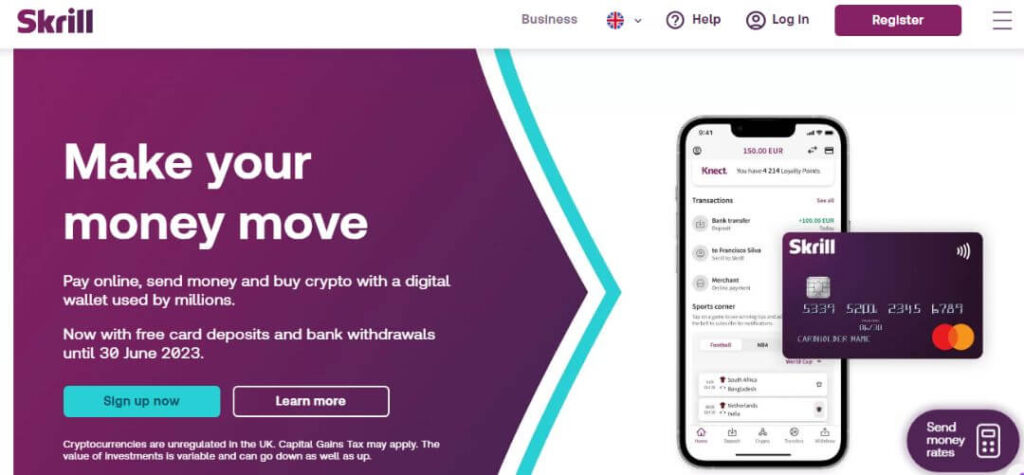
Overview:
Skrill is a popular payment gateway known for its international reach and support for multiple currencies. It caters to businesses and customers worldwide, offering secure payment processing, fraud protection, and a user-friendly interface.
Key Features:
- International reach and multi-currency support: Skrill enables businesses to accept payments globally, providing access to a more extensive customer base.
- Secure payment processing: Skrill prioritizes the security of transactions, implementing robust measures to protect against fraud and unauthorized access.
- User-friendly interface: With an intuitive interface, Skrill ensures a smooth payment experience for both merchants and customers, promoting ease of use.
Pros:
- Global coverage and accessibility allow businesses to expand their reach and cater to international customers.
Cons:
4. 2CheckOut Now Called Verifone
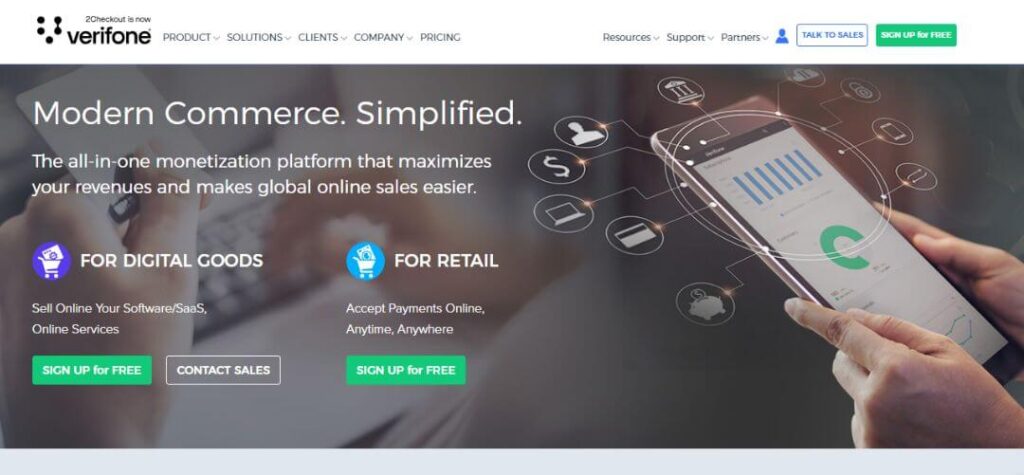
Overview:
2CheckOut is a global payment gateway that supports multiple payment methods, including credit cards, PayPal, and digital wallets. It offers a user-friendly interface, advanced fraud protection, and recurring billing capabilities.
Key Features:
- User-friendly interface: The platform’s intuitive interface simplifies merchants’ setup and management process, reducing complexity.
- Wide range of supported payment methods: 2CheckOut caters to diverse customer preferences by accepting various payment options, ensuring flexibility and convenience.
- Advanced fraud protection: 2CheckOut employs sophisticated fraud detection mechanisms to minimize the risk of fraudulent transactions.
Pros:
Cons:
5. Orangepay

Overview:
Orangepay is a reliable payment gateway that provides businesses with secure and efficient payment processing. It supports various payment methods, including credit cards and digital wallets, offering a customizable checkout experience to meet specific business needs.
Key Features:
- Secure and efficient payment processing: Orangepay prioritizes the security of transactions and ensures the swift processing of payments for a seamless customer experience.
- Support for various payment methods: By accepting credit cards and digital wallets, Orangepay enables businesses to cater to customer preferences and enhance convenience.
- Customizable checkout experiences: Orangepay allows businesses to tailor the checkout process to align with their brand identity and specific requirements.
Pros:
Cons:
6. BlueSnap

Overview:
BlueSnap is a comprehensive payment gateway solution that offers a wide range of payment methods, global support, and advanced features like subscription management and automated tax compliance.
Key Features:
- Diverse payment method options: BlueSnap supports multiple payment methods, including credit cards, digital wallets, and local payment options, catering to the preferences of a global customer base.
- Global support: BlueSnap provides extensive coverage, enabling businesses to accept payments from customers around the world, expanding their market reach.
- Advanced features: BlueSnap offers features such as subscription management and automated tax compliance, streamlining business operations, and reducing administrative burdens.
Pros:
Cons:
Best Payment Gateway for Small Businesses and Startups
For small businesses and startups, selecting the right payment gateway is crucial for seamless payment processing and customer satisfaction. Let’s explore two popular options that cater specifically to these needs:
1. WooCommerce Payments

Designed exclusively for WooCommerce users, WooCommerce Payments offers a tailored payment solution seamlessly integrating with your WooCommerce store. Its user-friendly interface and simplified setup process provide a hassle-free experience for small businesses.
WooCommerce Payments ensures secure payment processing, giving you and your customers peace of mind. Additionally, it offers robust features such as fraud protection and chargeback management, enhancing the security of your transactions.
Key Features:
- Seamless integration with the WooCommerce platform
- User-friendly interface and simplified setup
- Secure payment processing with advanced fraud protection
- Transparent transaction fees
- Chargeback management for added security
User Experience:
WooCommerce Payments provides a smooth and intuitive payment experience for small businesses and startups. Its seamless integration with the WooCommerce platform eliminates the need for third-party plugins or additional configurations, streamlining the checkout process and enhancing customer satisfaction.
Pros:
Cons:
2. Shopify Payments

As an integrated payment solution for Shopify users, Shopify Payments offers a convenient and streamlined payment experience for small businesses and startups. It simplifies the setup process, eliminating the need for third-party gateways.
With competitive transaction fees and support for multiple payment methods, including credit cards and digital wallets, Shopify Payments ensures a seamless checkout process for your customers.
Key Features:
- Integrated payment solution for Shopify users
- Simplified setup and configuration process
- Competitive transaction fees
- Support for multiple payment methods
- Seamless integration with the Shopify platform
User Experience:
Shopify Payments provides a user-friendly and cohesive payment experience within the Shopify ecosystem. Its integration with the platform ensures a smooth checkout process, reducing cart abandonment rates and optimizing conversions for small businesses and startups.
Pros:
Cons:
Choosing the best payment gateway for your small business or startup depends on your specific requirements, platform preferences, and target audience. WooCommerce and Shopify Payments offer tailored solutions with user-friendly interfaces, secure payment processing, and simplified setups.
Evaluate your needs, consider the pros and cons, and select the best payment gateway for your business goals and customer expectations.
Launch Your Ecommerce Store Effortlessly Today!
Selecting the right payment gateway is crucial in launching your ecommerce store. By considering the factors mentioned earlier and exploring the top payment gateway options, you can ensure a smooth payment experience for your customers.
Keep in mind that establishing a smooth payment process is paramount to building trust among your customers and ensuring the overall prosperity of your ecommerce venture. Choose a payment gateway that perfectly matches your business requirements, boasts robust security features, and presents a user-friendly interface.


Why Do Dropshippers Need Ecommerce Payment Gateways?
The importance of having an ecommerce payment gateway for dropshippers cannot be understated. Dropshipping has emerged as a popular business model in the ecommerce industry, and a reliable payment gateway is essential for its success. Here’s why dropshippers need ecommerce payment gateways:
Secure Payment Processing: With an ecommerce payment gateway, dropshippers can ensure secure and encrypted payment transactions. This safeguards their business and customers from potential fraudulent activities, instilling trust and confidence.
Smooth Order Fulfillment: A streamlined payment process enables dropshippers to process orders swiftly and efficiently. It ensures timely order fulfillment, contributing to improved customer satisfaction and positive feedback.
Automated Revenue Collection: Many payment gateways offer automated features for recurring billing. This is particularly beneficial for dropshippers who have customers with recurring payment plans or subscriptions. Dropshippers can effortlessly collect recurring payments without manual intervention by automating revenue collection.
Which Payment Gateway Is Easy to Use with Dropshipping?
When it comes to dropshipping, simplicity, and ease of use are crucial. One payment gateway that stands out in terms of user-friendliness is PayPal. PayPal offers a seamless integration process, a straightforward user interface, and widespread customer acceptance.
It enables dropshippers to manage transactions efficiently and provides an easy-to-understand dashboard for order tracking and payment management.
Dropshipping Payment Gateway Combos
In addition to PayPal, some dropshippers find success by combining it with other payment gateways to offer more options to customers. For example, you can integrate Stripe alongside PayPal to cater to customers who prefer alternative payment methods.
This combination allows you to expand your reach and provide a variety of payment options to accommodate different customer preferences.
By implementing a suitable payment gateway combo, dropshippers can maximize conversion rates and offer a convenient shopping experience for their customers.
Here are the top payment gateway combos:

Read more:
- 7 Best Inspiring Ecommerce Pricing Strategies For Your Products
- 7 Best Shopify Alternatives In 2023 To Skyrocket Your Ecommerce
- The Pros And Cons Of Selling On Amazon Vs EBay – Better For Sellers?
- The Pros And Cons Of Selling Online On Shopify Vs Etsy In 2023
- Pros And Cons Of Starting A Print On Demand & Grow Your Business
FAQs On Secure Payment Gateway For Ecommerce Business
To address common queries related to payment gateways, here are a few frequently asked questions:
Does your payment gateway support many payment methods and currencies?
Choosing a payment gateway that supports the payment methods and currencies most commonly used by your target market is essential. Offering various payment options will enhance customer convenience and improve conversion rates.
Is the payment gateway supported on your ecommerce platform?
Verify that the payment gateway integrates seamlessly with your chosen ecommerce platform or content management system. Compatibility ensures a smooth integration process and reduces any potential technical complications.
What are the best payment gateways in terms of availability across the world?
Consider payment gateways that have widespread availability, ensuring you can reach customers worldwide. Popular options like PayPal and Stripe offer global coverage and are widely recognized and trusted by customers.
Does the payment gateway support the payment methods your target market uses?
Research the preferred payment methods in your target market and select a payment gateway that supports those options. It ensures customers can pay using their preferred methods, increasing the likelihood of completed transactions.
Are you in a ‘high-risk’ business?
Payment gateways consider Some businesses high-risk, such as Diet Programs, Gambling, Tobacco, Credit Repair, and Debt Collection. If you fall into this category, ensure you choose a payment gateway that caters to high-risk businesses. Look for providers specializing in high-risk industries and offering robust risk management tools and solutions.
Remember to consider these questions and tailor your payment gateway selection to meet the unique needs of your business.
Bottom Line: How To Choose The Best payment gateway For Ecommerce
Integrating an online payment gateway into your ecommerce business can yield significant advantages. Utilizing such a gateway ensures a secure and smooth payment experience and an expansion of payment options for your customers.
Implementing this technology will streamline your business operations, facilitating efficient transaction processing and reducing manual efforts.
When selecting the most suitable payment gateway for your ecommerce store, a thoughtful and thorough evaluation is paramount. Consider the transactional efficacy of the gateway, ensuring that it can handle the volume and complexity of your business requirements.
Additionally, prioritize the robustness of its security features to safeguard sensitive customer information and protect against fraudulent activities.
The ease of integration should also be a decisive factor. Look for a payment gateway that seamlessly integrates with your existing ecommerce platform, minimizing disruption and allowing for a hassle-free implementation process.
Furthermore, comprehensive customer support is crucial to address any issues that may arise, ensuring prompt assistance and maintaining a positive user experience.
By carefully assessing these critical aspects and exploring the top payment gateway options available, you can make a well-informed decision tailored to your specific business needs. Remember, the chosen gateway should meet your current requirements and have the scalability to accommodate future growth and expansion.
Ultimately, by selecting the best payment gateway for your ecommerce store, you enhance the overall efficiency of your business, boost customer satisfaction, and foster long-term success in the ever-evolving digital landscape.









